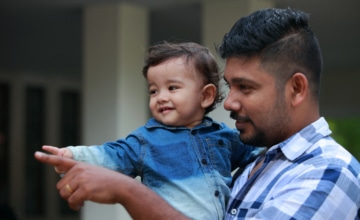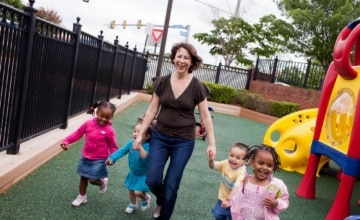Q & A With Shin Yee Tan, ZERO TO THREE Fellows class of 2020–2022
1. Briefly describe the burning issue, need, or question that you are addressing through your Fellowship and how it has come to mean so much to you.
The dream I’m working to realize through this fellowship is to build a network of support for infant/early childhood providers in the state of Indiana. The system of care in Elkhart County, Indiana, is fortunate to receive substantial funding from SAMHSA to advance children’s mental health in our little county of 200,000 population. This funding allows us to pilot innovative programs for children birth to 18 years old. As a system of care, we rely on collective impact to leverage our work.
Our infant/early childhood mental health program, Together We ROCK (Reach Out to Connect Kids), is based on the premise that supporting caregivers (both parents and providers) will lead to sustainable change in young children’s lives through the power of connection and attachment. Akin to parallel process, we build the capacity of the supervisors so they can support their staff and parents by building rock-solid relationships with the supervisors.
We take it up a notch by collaborating with various community partners to support the supervisors. This fellowship and the ZERO TO THREE community have widened my perspectives and eyes to what is available nationally and given me an even greater understanding of policy and advocacy. Through networking with other Fellows, I learn that we all can advance change multiple levels from where we sit. While my eyes may be on the macro level of how systems support and perpetuate the lives of young children, I can advance infant/early childhood mental health at the micro level in my community.
2. How have the current events, crises, and societal upheavals impacted your work and your perspective of the work ahead of you?
Pre-pandemic, the child care industry had already been struggling with staffing issues as child care teacher is an under-appreciated profession, even amongst the teachers themselves. As noted in recent reports from NPR and RAPID-EC, this struggle has risen to a crisis level! Our community is not immune from this crisis. We witness teachers who are stressed and unable to co-regulate the children; child care directors who must be bus driver, teacher, and kitchen staff all in one day; parents who pivot constantly between regular child care, staying home with children, and alternative temporary child care; and lastly, little ones who aren’t sure who will be in the classroom from day to day.
With that in mind, our program has been trying our best to listen to and support child care providers. We utilize the Conscious Discipline approach as our common language to emphasize that adults’ own regulation skills are just as important as teaching children social–emotional skills, if not more.
One silver lining of COVID-19 is that mental health is elevated to public health crisis level. With that, infant/early childhood mental health no longer needs to hide under the mantle of social emotional learning. We can shout from the rooftop that everyone, from cradle to tomb, has mental health.
The American Rescue Care Act opens a new opportunity. Now we are facing a reverse dilemma—how do we spend this big pot of money effectively? Using the available funding, we are exploring expansion of our consultation model to a neighboring county. This is an exciting time as we utilize cross-sectorial (e.g., for-profit, child care, social services, and mental health) collaboration to support the child care industry in our county.
3. What would you like our members to understand or recognize about the children, families, and professionals with whom you work?
Regardless of geographical location, early childcare professionals are struggling. While the rest of the world have moved on with vaccination and booster, this group of professionals can’t, yet. They are constantly exposed to a population who aren’t eligible for vaccination, let alone a booster. Daily, they have to juggle between keeping all the children safe and building attachment with each child. How do you balance this dichotomy? Have grace for parents with young children; have grace for early child care professionals who may not see themselves as professionals; and lastly, have grace for the child care directors who are constantly putting out fires to keep their centers open.




